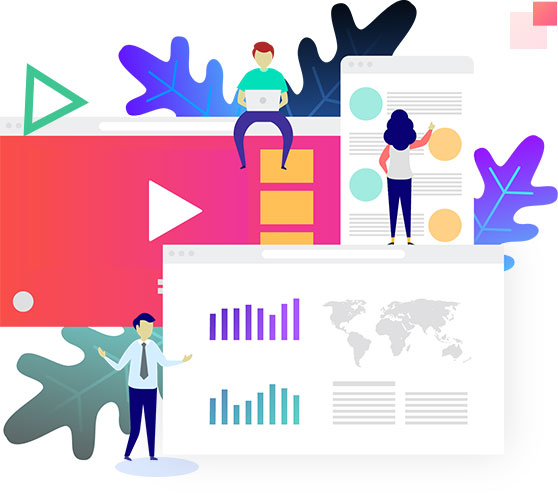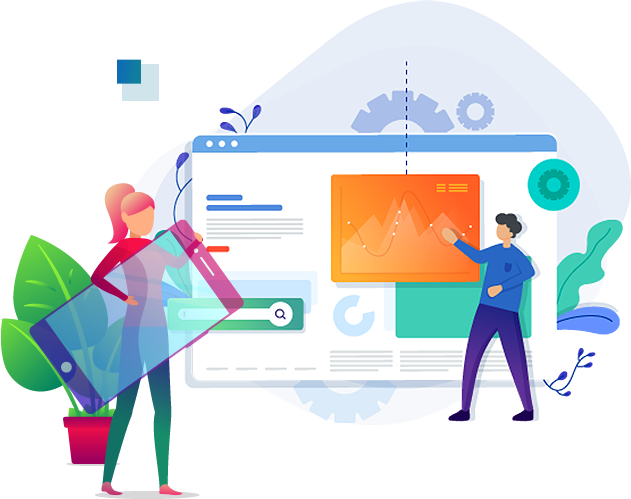Why Paid Search is Important
With over 3.5 billion Google searches conducted daily, most companies and non-profits understand the value of turning up for specific search queries. There are many ways to improve exposure of a website in search results, most notably search engine optimization ( SEO) and search engine marketing ( SEM or paid search).
SEO focuses on organic ranking strategies and SEM uses paid advertising to display websites in search results. While both are critical assets to any digital marketing plan, paid search has a set of advantages worth discussing. There are several different paid search platforms available, but Google Ads, formerly Google AdWords, is the most popular with about 65 % market share.
Reasons Why You Need PPC For Your Business
PPC (pay-per-click advertising) is important for online business success and a critical component for a effective, full digital marketing campaign.
Many small business owners underestimate ppc ‘s benefits and as a result they miss a major opportunity to expand their online business quickly in a regulated and profitable way.
Pay per click advertisement, whether by Google Ads, Bing Ads, Facebook Ads or Twitter-promoted tweets, is a perfect way to easily meet your future buyers and advertise your products or services. This model has evolved over the years, and PPC campaigns may use other pricing models such as CPM (pay per thousand impressions) or CPA (pay when a click on the ad leads to conversion).
The general concept about PPC is that it helps you to easily reach targeted audience by deciding who should see your advertisements (either by entering unique keywords or demographic characteristics) and pay only when someone takes an action on your advertising.
1. It Is Cost Effective
One myth about PPC campaigns is about expense. Many people believe PPC is a waste of money that keeps them from using it. It’s true that if you’re not careful how you’re spending your money, you’ll end up draining your budget on buying hope, not real results.
Nevertheless, if you obey these basic rules, you increase the chances of successful promotions. Start slow, calculate and grow big – don’t throw all your money on your first campaign when you start with PPC, but start with a small campaign and you can spend more money depending on the results. All is observable from the views your ads get, clicks you get, visits to your website and conversions so make sure you research these figures well before investing more.
If you’re new to Adwords, Bing or Facebook ads, it’s better to hire professionals to set up campaigns for you, and if you can’t afford them to optimise campaigns on a monthly basis, at least you’ll know your ‘base’ is right.
Using ways to lower your CPC costs – one that is tailored is a successful ppc programme, and there are other ways to lower your CPC costs and achieve more with less budget. Don’t assume these strategies are useless, PPC is like SEO, where optimization is a fundamental part.
Keep growing your budget as long as it’s profitable – that could be the most critical rule in PPC management: raise your budget on profitable campaigns and not on non-profit campaigns. Initially, running non-profitable campaigns is normal because the optimization period may take a few months, but in the long run you should not spend money without a positive return.
Learn from your competitors – The first approach to take when developing a new PPC campaign is to look at what your rivals are doing. Low-cost competitive intelligence tools like SEMRUSH will give you lots of knowledge about your competition. Things like how much they spend, for which keywords they rank, the actual ad copy they use is data you can get through a competition analysis report. Research this data for your own good.
Spend money on keywords that generate profit – Another reason that makes PPC a cost-effective advertising solution is that you can control your budgets and allocate it to profitable keywords or audiences. When you first set up your ads, you do so based on what you think can work, but after a couple of weeks you’ll see some keywords (or audiences) perform better than others. Use this information and adjust your bids and targets to give more preference to these potentially profitable areas, and less or none to others.
2. It's The Fastest Method to Get Targeted Visitors
When you run an online business, you need traffic, not any traffic, but targeted traffic that could potentially lead to more sales and business. SEO is the first thing that comes to mind when talking about targeted traffic, but we all know it takes time to work so PPC is the next best way to get you targeted traffic fast. With Google Advertising, you can select the keywords to show your advertising and they will appear on top and bottom of Google Search results. With Facebook Advertising, you can identify your target market based on Facebook’s many demographic features for us all.
We work with a number of companies that make money online through PPC without having good organic rankings.
Their success involves 3 things:
- Quality of products they offer
- Extremely adapted landing pages
- Highly optimized PPC campaigns
SEO can help with conversion optimization and PPC optimization, but SEO alone can not help a new business grow rapidly. SEO may take months or years to bring targeted traffic while PPC is almost instantaneous. The rewards of achieving high organic rankings are immense, but you need to be diligent and have a strong SEO strategy to get there.
3. It's The Easiest Way To Test If Your Product Sells
You have a nice-looking website and ready-to-ship goods, but don’t know if your products sell or if your website converts, what’s the quickest way to find out the truth?
Google Adwords programme, get 1000 targeted visits and evaluate the impact. It will cost you to do this check, but if you plan for a long-term online presence, the money you invest on improving your website will produce more revenue in the future.
Businesses who don’t follow this road of testing and refining but go blind thinking their website works and selling their goods because they believe so are doomed to fail. What your designer and web developer thinks is user-friendly and converting isn’t always what works for users, and a focused PPC campaign will help you discover the reality.
4. It Works Well With Other Digital Marketing Channels
PPC ads is a key component of the digital marketing campaign and works well with other marketing platforms.
For example:
- You can use dynamic search ad campaigns and let PPC tell you which keywords fit your website.
- You may use PPC to check the efficacy of different keywords to know which keywords to target with long-term SEO.
- You can use PPC to get more instals for your mobile app and improve your mobile marketing.
- Using PPC to get more email sign-ups and improve the email marketing campaigns.
- Local SEO optimization is fantastic – you can use PPC to push customers to your shop door or get direct calls from customers finding goods and services in your location.
5. It Allows You To Execute Advanced Marketing Techniques Like Retargeting
Retargeting is one of the most powerful ways to maximise conversions. Retargeting is a strategy where you build ads and target people who have already visited your website but have not converted. For example , suppose you have a website selling engagement rings. Customers shopping for online engagement rings go through a purchase process that involves searching for the items they want and looking at various websites. The timeframe for making a decision can be extended to 30 or 60 days, as the products are expensive and the available sellers a lot.
It’s a classic case where retargeting will produce great results. By inserting a piece of code generated by Google Adwords, Facebook or even Twitter, you allow these networks to recognise people who visited your website but did not buy a product from you. You can then develop ads targeting these people and give them opportunities to revisit your website and complete the purchasing process.
6. When Should You Use PPC?
PPC fits almost any type of business. They can be used to promote products , services, increase brand awareness or generate new leads from Google or social media sites. As a startup, you can use PPC and take advantage of all the above-mentioned benefits, and as an established business, you can use PPC to expand your business online. Using PPC when you have time-sensitive deals (or events), because no other digital marketing tool (except social media marketing) can provide immediate access to your target audience. Use PPC for keyword domination – even with good organic rankings for specific keywords, you can still use PPC and dominate the search results.
7. When You Should NOT Use PPC?
Typically PPC isn’t a good partner when:
- Your goods have a very low quality, so the profit margin is not high for the expense of running pay-per – click campaigns.
- Have an adsense website. Adsense and adwords may work together, but certain instances should not be used in tandem. Read adwords vs adsense for details.
- Don’t try PPC if you don’t know how to do it correctly. Running adword and facebook campaigns isn’t hard, but if you’re not sure how they work, you’ll end up wasting a lot of money with little return.
The take-away message from this article is that PPC is a must-have tool for almost every company, and if you don’t use PPC yet, you ‘re missing major growth opportunities.
Pros & Cons of PPC Marketing
Many see pay-per – click or PPC marketing as one of the best ways to promote online business. It is considered the first logical step for advertisers and business owners to take in checking productivity and ROI keywords before trying their hands on Search Engine Optimization or SEO. But like SEO, PPC ‘s share of advantages and disadvantages. Before plunging into PPC, it’s a good idea to learn its pros and cons first, so you can make the most of it.
The Pros of PPC Marketing
1. PPC Offers Retargeting or Remarketing of Your Visitors
2. PPC Gives You Measurable Results
PPC results are more measurable than SEO. This is because PPC networks like Google AdWords have various types of metrics that allow website owners to see whether their ads actually convert and give them a fair ROI. These metrics allow you to see how many people saw your ad, how many clicked it, and how many performed the action you want them to perform.
3. PPC Allows You to Track ROI with Conversion Pixels
If you run a PPC campaign, it’s crucial to assess which keywords, ad messages, and landing pages are converting. It used to be hard to do because it requires tracking down to keyword level, but thanks to pixel tracking, it is now a painless operation. Pixel monitoring is simple using the tracking code that is the basic feature of most PPC services including Adwords and Facebook Ads.
4. PPC Gives You Quick Results
If you want quick results, PPC is your method. Like SEO, it doesn’t take loads of patience. It’s easy to set up a PPC campaign through Google AdWords or other search engine equivalent networks. It takes three simple steps. Next, building an account. First, you need to build advertisements and offer keywords that you think your target audience would use to scan search engine information. Eventually, you must guide them to a very specific landing page for optimal results.
Just sit back and wait before someone clicks on your ad. And speaking of waiting, you needn’t wait long to see PPC results. Getting a successful ad and following the steps of setting up a PPC campaign to the letter, your site will certainly rank immediately, and you can expect sales to flood in soon afterwards.
5. PPC is Actually Affordable
Some people shy of PPC ads because they think it’s costly. Yet if you think about it, PPC is really affordable. Plus, the ROI can be massive. You don’t have to pay with PPC to have your ad inserted in a search engine by choosing to use the pay-per – click option. Unlike other forms of online advertising you need to pay if someone clicks your ad. PPC also lets you set your own budget. You can be as militant or cautious as you like. So long as you know how much you ‘re prepared to spend, there’s no chance going over budget.
6. PPC Allows You to Track Your Ads in Real Time
To ensure that your ads target the right people and effectively bring traffic to your site, you need to track it. PPPC also allows marketers to monitor their advertisements in real-time. This means you get immediate details about your keywords and ad messages results, how much traffic your ads bring in, how much traffic is being converted into sales, etc. With other forms of online advertising, you can only see results months after ads are set up. Because PPC offers real-time ad tracking, you can make adjustments immediately if an ad doesn’t bring the results you want.
7. PPC Exposes Your Business Both Locally and Globally
No matter how good your ad is, it’ll be useless unless the right audience sees it. For example, if your ad is for a local company, advertising it to the global market is of no benefit. On the other hand, if your ad is intended for an foreign audience, local ads will restrict its possible scope. One of the best things about PPC marketing is that it helps marketers to monitor where their advertisements are displayed. This makes PPC ideal for local and international brands, as well as local business owners and internet marketers.
8. PPC Provides Greater Control
If you’re someone who needs more influence over your online marketing campaign, then PPC marketing is the right strategy for you. Simply predicting SEO visitor experience is hard. This is because it does not allow webmasters to choose which website will be shown on search engines. This makes it difficult to create a strategic user experience for your guests, particularly new ones. For PPC networks like AdWords, you have a definite say on which page to go to guests. And if you’re the kind of marketer or website owner who needs your site’s visitors to follow a particular route, you can do PPC marketing.
The Cons of PPC Marketing
1. PPC Can Be Quite Complicated
PPC and other digital marketing strategies, like SEO, aren’t easy. Since PPC includes a lot of variables and you’ll lose a lot of money if you’re not careful, companies find it very difficult to compete with other digital marketing approaches. That’s why it may be a smart idea to call someone to handle the complexities of the PPC to optimise your ad budget. That doesn’t mean PPC learning isn’t for anyone. It also means more time and energy to learn how to optimise PPC compared to other digital marketing strategies.
2. PPC Shares Advertising's Woes
3. PPC is Not Free
The key reason many people still don’t use PPC is because it’s not safe. If you’re a small business owner, you’ll do anything to save money. Therefore, in Internet marketing, SEO is the more rational alternative. And if you don’t know what you’re doing with PPC, you can quickly start piling the cost. Some businesses even deliberately click ads from their competitors to drive up their advertising costs. If you’re a struggling entrepreneur, you can’t afford to happen to you. When you want to hire an professional to help you with your PPC campaign, that’s another thing to add on your expense list, but it could be a smart choice, particularly if you choose an experienced PPC marketer.
4. PPC Ads Disappear When Your Campaign Ends
When you post content on high-trafficking and popular pages in your niche, you will be on the web as long as it exists. It can work for you years after it’s published. PPC advertisements stop running when you stop paying. So when the advertisements cease, the traffic so sales that come with it always cease. When you have a big advertisement budget, it wouldn’t be a problem. Yet if you’re cash-strapped, it’s hard to support a PPC programme.
5. PPC Is Not A Sure-Fire Way To Get Sales
Some business people think PPC is sure. They think they’ll get plenty of conversions just because they’ve spent a lot of money on a campaign. That’s what many online marketers want you to believe. But, sadly, that’s not reality. The truth is, conversions depend on many different things: ad quality, keywords, product or service, etc. PPC is a gamble, and if you’re afraid to take the risk and lose money, you should stay away.
6. PPC Firms Can Be a Pain
It was stated earlier that many website owners and online entrepreneurs turn to marketing companies from PPC for their PPC campaigns. That’s a smart idea as long as you know which PPC to work with. But there are also shadowy firms that gave a huge, unnatural pledge, but they can’t get real results. To defend yourself from these companies, it’s a good idea to be cynical. When it sounds too good to be real, it’s probably.
Have rational PPC goals. A PPC company will help you set up and run your campaign, but they can’t turn you into millionaires overnight. Once you join a PPC company, it’s always a good idea to do a study first. The best companies are those with years of PPC experience and, if appropriate, can provide customer service.
Truly, the business’ PPC marketing has its pros and cons. For a company owner, you can first be acquainted with these items or consider using them. Our aim in this post is to provide the most truthful and accurate PPC marketing information. I hope this article will help you and your company.
Paid Search Services
Search Ads
Display Ads
Display advertisement refers to the method of promoting a product or service through photos and videos on publisher websites such as the Google Display Network and Facebook, etc. Display ads are displayed in banner, image, and text ads on related third-party websites.
Social Ads
Remarketing Ads
Shopping Ads
Local Service Ads
Sponsored Promotions
Instream Ads
In-App Ads

With PPC, you have to measure success through return on investment (ROI)
What gets measured gets improved.
WHY CHOOSE US
Let’s get started

Unmatched Analysis
After thorough market research on customer brand and offerings, we set goals for each project and map clear strategy to meet these goals.

Increased Visibility
We promote your business in online platforms to offer optimal web exposure, such as major search engines, forums and social media.

Higher ROI
When your website is optimally exposed online, visitors get attracted to your website and buy your product and services to bring growing returns.

Long Term Results
We use effective digital marketing methodologies, practices and techniques to achieve long term top placement in SERPs for our clients.

Cost Effectiveness
We offer our reliable, top-class digital marketing services at a price everyone can afford. For our services, you don't need to make a hole in your pocket.

Transparency
We believe transparency is key to building client trust. Therefore, we keep our clients updated by providing monthly reports highlighting key results.
Try to say it all in an ad, and you'll end up saying nothing

Quote Request Form
Please fill out the form below to receive a free quote for our paid search services. Select what services you are interested in below and we’ll contact you as soon as possible.
The Most Asked Question About Paid Search
Frequently Asked Questions
1. Is paid search SEO?
Paid search traffic is attributed to visitors clicking a link in an advertisement or sponsored listing that a business paid for to appear at the top of search results.
2. Why is paid search important?
Paid search ads help you generate more leads. This means more qualified traffic from these ads to your site. PPC ads are important in helping businesses generate more qualified leads.
3. How much does paid search cost?
Giant retailers can spend up to $50 million annually on paid Google Ads search. Google Ads average small business spends between $5,000 and $10,000 a month on their Google paid search campaigns.
4. Is paid search the same as SEM?
It is intended to cover both search engine optimization ( SEO) and paid search, also known as PPC (pay-per-click) or CPC (cost-per-click). SEM still occasionally refers to paid search with less emphasis on SEO, but that's even rarer than using the term properly.
5. Is paid search worth it?
Put it simple, paid search is when you buy keywords and create ads when someone searches for those keywords. When done properly, paid search can be a fantastic tool for small businesses. This can put your business infront of customers looking for what you're offering when they're ready to buy.
6. Does PPC work?
PPC is highly effective for small budgets. Targeting: Using PPC to target visitors at all buying funnel levels. Start by focusing on keywords when people are ready to buy. The lower in the funnel, the higher conversion rate expected.
7. How do I run a paid search campaign?
Choose keywords. Keywords target to become specific. Structure the account. If you run ads for many items or services, you need to split them into ad groups. Use time wisely. Write and edit ad-text.
8. Is paid search the same as PPC?
Pay per click, or PPC, is the most common paid search model and is commonly used to refer to paid search. As mentioned above, it's basically the same as Cost Per Click (CPC): the advertiser pays the search engines per click on their ad.
9. How effective is paid search?
No doubt paid search advertising can be a powerful tool to generate brand recognition, leads, and sales. Not only do excellently-crafted, targeted ads maximise the efficacy of your promotional campaigns, they achieve their full potential when combined with an integrated post-click experience.
10. What is a paid search result?
Paid search results are simply business-paid advertising to jump above organic results as soon as possible. Marketers invest in SEM (search engine marketing) to boost their website to (ideally) the first page when someone types a question using specific keywords.
11. What is the difference between paid and organic search?
Organic search is based on unpaid, natural search engine algorithms rankings and can be optimised with various SEO practises. In comparison, paid search allows you to pay to view your website on the search engine results page when someone types in unique keywords or phrases.
12. What is paid SEM?
SEM is the act of using paid strategies to increase search visibility. Brands pay for ads appearing on search engine results pages. Brands pay for ads appearing on search engine results pages (SERPs) with SEM.
13. What is SEM vs SEO?
SEO (search engine optimization) refers to optimising your website to better compete in search engines like Google. SEM (search engine marketing) applies to search engine marketing practises like SEO and pay-per-click (PPC), local search engine listings, and more.
14. Which is better SEO or SEM?
These methods aim to increase search engine visibility. SEO aims to optimise your website for higher rankings in organic search results, while SEM goes beyond SEO. This includes other approaches that can get search engine traffic like PPC ads.
15. What does a paid search specialist do?
Also known as a PPC specialist, a paid search specialist performs analysis, makes purchasing decisions, analyses results, and changes direction as needed to improve those results.
16. How do you optimize paid search?
Search Engine Marketing and Paid Search approaches are common marketing techniques that draw consumers depending on online knowledge to buy goods and services. Via Paid Search Marketing, you get consumer data to help with potential campaigns or advertising. Paid Search management, however, can be a frustrating journey as there are hundreds of variables that can determine its success , especially if you don't revamp or improve your strategies. Before beginning a new campaign, decide your number one target for Paid Search and build a SEM strategy that can best be implemented to make it work. Such advanced search optimization strategies will help you achieve this goal.
17. What's PPC in marketing?
PPC stands for pay-per-click, an internet marketing strategy where advertisers pay a fee each time an ad is clicked. Essentially, it's a way to buy site visits rather than trying to "earn" those visits organically. Search engine advertisement is PPC's most common type.
18. What is a paid search manager?
PPC/Paid Search Manager is responsible for developing company marketing campaigns for Pay Per Click. PPC Coordinator can easily identify, execute, and promote programmes that lead to company campaign priorities and progress.
19. How do you optimize a search campaign?
Using scheduling advertising. Not all clicks convert at the same. Lower CPC Bids. Lowering CPC bids is a perfect way to incorporate a small budget and push more clicks with the same budget. Optimizing keywords. Shift budget from low-converting campaigns.
20. What is paid search in Google Analytics?
The Google Analytics Paid Search channel contains all traffic sources that carry visitors to your site designated as CPC, PPC, or paid search. Note that this category can include sources beyond Google, Bing, and Yahoo.
21. Is paid search marketing is completely driven by Google?
Paid search marketing also involves bidding, and buying relevant keywords is the main source revenue for search engines. Therefore, Paid Search Marketing is largely powered by Google, and now Google has invented its algorithms with numerous extensions including Facebook Adwords etc.
22. What is a good PPC?
The average PPC conversion rate across all industries is about 3.75%. And it's around 0.77% for display networks. This conversion rate varies with each industry. With the dating and personal sector leading at 3.34% and home goods badly at just 0.43%.
23. What is a Google Adwords specialist?
A Google Adwords specialist is a person with comprehensive knowledge of PPC ads, who can set up an advertisement campaign for Google Adwords on Google Shopping, perform an audit for PPC and Adwords, and compare the direction of a campaign to drive a favourable consumer rate to a website store.
24. What is PPC management services?
PPC management is where a marketer (or marketer team) manages a company's entire marketing campaign and budget. This can be achieved by an in-house marketers and media buyers department, or outsourced to an external firm. Like Google Ads, Bing Ads, display networks, and even social media advertisements.
25. Is paid search worth it?
Simply put, paid search is when you buy keywords and build advertisements when someone searches for keywords. When done properly, paid search can be a fantastic tool for small businesses. This can put your business before customers looking for what you're offering when they're ready to buy.
26. Why is paid search important?
Paid search ads help you generate more leads. This means more qualified traffic from these ads to your site. PPC ads are important in helping businesses generate more qualified leads.
27. Is SEO or PPC better?
Organic search engine traffic can provide increased ROI over conventional pay media sources, and definitely boost PPC. Although SEO is neither cheap nor free, your website will generally be more cost-effective than any other marketing strategy to produce brand awareness and related traffic.
Latest Blog Posts
Trending blogs & articles







